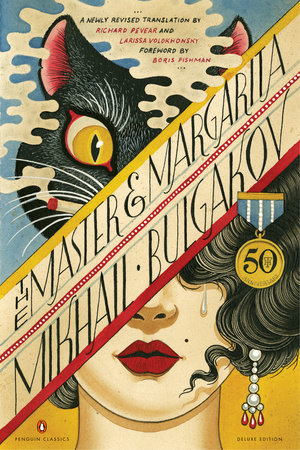⋆⋆⋆⋆⋆
Content Warning: violence, murder, death, torture, animal cruelty, animal death, forced institutionalization, alcoholism, outdated/offensive racial terms.
It's spring when Satan arrives in Moscow. Fascinated by the Soviet Union and its avowed atheism, his companions -- including a strange man wearing a cracked pince-nez and a huge, talking black cat -- take it upon themselves to inject a little black magic into the lives of Russians. Two of the Muscovites caught up in Satan's games include the beautiful Margarita, unhappily married, and her lover, known only as the Master, who has sadly ended up in a mental institution after attempting to publish a novel about Pontius Pilate. Brought together once more by the strange forces plaguing their city, Margarita and her literary Master will find themselves embroiled in questions that have haunted man since the dawn of time, and might end up finding an unexpected peace in the midst of it all, too.
It's hard to categorize a novel as deep, layered, and complex as The Master and Margarita. I'm not new to Russian classics, but reading this one felt like its own unique experience, totally devoid of the familiarities I'm used to when I'm reading Tolstoy or Dostoevsky. While many of the questions posed here are similar to works by those authors (and many, many others), there's something totally and completely fresh about Bulgakov's satiric take on the existence of God and Jesus, the black history of Russia, and the nuances between good and evil.
This is a truly beautiful story, in all ways. Despite the fact that it's told with a sense of lovely black humor (that never fails to hit its mark), there's also a quietness and seriousness that help us to understand the gravity of what Bulgakov is trying to tell us. He addresses the crushing Soviet regime, which, in his own life, caused him so much pain, depression, and also tried to keep him from his creative pursuits (which, thankfully, he kept pursuing nonetheless). It's mirrored in the Master's narrative, but also in the many other narratives that populate this novel. All of Bulgakov's Soviet Muscovites operate under the same veil of fear and paranoia, as well as the secret hope that the future may be brighter.
Alongside the chapters that take place in 1930s Russia, there is also the story of Pontius Pilate, the passages taken from the Master's book as a sort of narrative foil to what's going on in Moscow. These elements, despite their seeming disparateness, come together flawlessly, and although I do think that the portions containing the story of Pilate, Yeshua and other Biblical figures are perhaps my favorite, I was never bored while reading the others. Bulgakov vividly brings to life Jerusalem, with lines so arresting I often paused just to drink them in. The characterizations are brilliant, filled with the idiosyncrasies of real people, bringing a balancing realism to this fantastical tale.
The question of good and evil is raised in this book, as, of course, it must be, when the novel is so influenced by religion and existentialism. I greatly enjoy Bulgakov's take on it, the idea that one cannot exist without the other, and also loses its meaning in the absence of its opposite. His views feel just as poignant as, for example, Dostoevsky's, but in my humble opinion, not quite as ham-fisted.
A gorgeous, must-read classic, that will never stop being relevant. Highly recommended, especially to lovers of Russian literature who might not have gotten to his works yet.


No comments:
Post a Comment